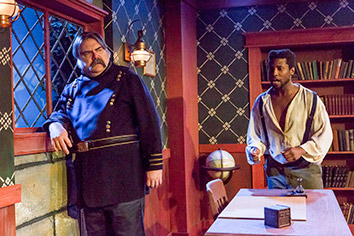Subscriber Benefit
As a subscriber you can listen to articles at work, in the car, or while you work out. Subscribe NowThe best legal thriller I’ve seen in years, Richard Strand’s “Butler” doesn’t venture anywhere near a courtroom, judge’s chamber or jury room. But it is about a legal mind wrestling with a legal problem and trying to come up with a legal solution. It’s also a comedy. A very good one. And a drama. An equally good one.
 As seen at the Phoenix Theatre (through Feb. 7), “Butler” is set in Virginia’s Fort Monroe near the beginning of the Civil War. The title character, Maj. Gen. Benjamin Butler (Stephen Hunt), is a lawyer only recently part of the army of the North, bumped up to a command thanks to his connections to President Lincoln. He’s still unpacking his new office when a problem arrives in the person of Shepard Mallory (Ramon Hutchins), a runaway slave who, with two companions, seeks asylum in the fort.
As seen at the Phoenix Theatre (through Feb. 7), “Butler” is set in Virginia’s Fort Monroe near the beginning of the Civil War. The title character, Maj. Gen. Benjamin Butler (Stephen Hunt), is a lawyer only recently part of the army of the North, bumped up to a command thanks to his connections to President Lincoln. He’s still unpacking his new office when a problem arrives in the person of Shepard Mallory (Ramon Hutchins), a runaway slave who, with two companions, seeks asylum in the fort.
The problem: By law, Butler must return the trio to their owners. Which he doesn’t want to do. Virginia has recently seceded to the South and, well, things are delicate.
Butler is no bleeding heart. This isn’t the kind of play where a heroic northerner and a flawless slave team up to stick it to the man. Butler is gruff, argumentative and prone to debate over minutia, particularly when it comes to language. (It’s unlikely, after seeing the play, that you will be able to hear the words “contraband” or “astonish” without thinking of him.) He also voted for Jefferson Davis, a fact he isn’t hesitant to admit. Butler can’t bring himself to break a law, even if he doesn’t agree with it.
And Mallory, hardly the saint, is a man who fully understands that the color of his skin isn’t the only reason most people don’t like him. Even with his life on the line, he can’t resist making one more comment or asking one more question.
 Confederate Major Cary (Doug Powers) reads a list of demands as skeptical Lt. Kelly (Brandon Alstott) looks on. (Photo courtesy of Zach Rosing)
Confederate Major Cary (Doug Powers) reads a list of demands as skeptical Lt. Kelly (Brandon Alstott) looks on. (Photo courtesy of Zach Rosing)I mentioned earlier that, in addition to being a sharp legal thriller, “Butler” is also a comedy, the best new one I’ve seen in quite a while. But it’s not packed with obvious punch lines. The humor comes out of solidly constructed, interesting characters facing a very real, very difficult situation. Strand plants seeds early that play off beautifully later. He knows how to escalate tension without holding back info in a way that comes across as manipulative. His characters, all of them, are thinking people trying to figure one another out and solve this high-stakes puzzle. I laughed. And cared.
Some hesitancy on opening weekend seemed to indicate actors were still thinking about their lines—there’s a lot of verbiage in this brisk two-act play. More performances, I’m confident, will alleviate some of that by the time you see it—which, if you haven’t been able to tell already, I’m encouraging you to do. I was surprised when the Phoenix—a theater that tends to look forward more than it looks back—put this one on its schedule. But I’m certainly glad it did.•
__________
This column appears weekly. Send information on upcoming arts and entertainment events to [email protected].
Please enable JavaScript to view this content.

